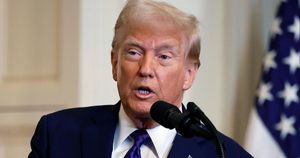Thousands of FBI employees who investigated the January 6, 2021, riot at the U.S. Capitol are undergoing detailed scrutiny as the Justice Department evaluates potential disciplinary actions.
The review process, ordered by the acting Deputy Attorney General Emil Bove, involves distributing extensive questionnaires to agents. These forms require individuals to detail their roles, including any arrests made, interviews conducted, or testimonies provided during the investigation.
According to reports, over 1,000 FBI agents and non-agent personnel across field offices and headquarters have received these surveys. Staff members have been told their responses are due by Monday. This unprecedented step by the Justice Department is alarming many within the agency.
Chad Yarbrough, the assistant director of the Criminal Investigative Division, echoed the concerns of employees, stating, “I know myself and others receiving this questionnaire have a lot of questions and concerns, which I am working hard to get answers to.”
This internal audit follows the recent termination of several senior FBI officials and leaders from the agency's Miami and Washington field offices, igniting fears of additional firings among those involved with the January 6 inquiry. Bove’s memorandum not only outlined the need for detailed individual evaluations but also mandated the compilation of all personnel who worked on this investigation.
James Dennehy, the assistant director of the New York FBI office, expressed concerns over the situation, noting, “Today we find ourselves in the middle of a battle of our own, as good people are being walked out of the FBI and others are being targeted because they did their jobs.” His memo also acknowledged the emotional toll this scrutiny is having on the workforce.
The surveys are seen by some as part of broader political pressures facing FBI employees, especially as critics claim former President Donald Trump’s administration is enacting purges of government officials closely associated with aspects of the Capitol riot investigations.
On Trump’s first day back after the election, he commuted sentences for 14 participants related to the attack, raising alarms about potential retribution against those who prosecuted or investigated these cases. Critics are vocal about the perceived targeting of FBI and Justice Department officials involved with the investigations, with political ramifications looming over their careers.
Dennehy’s memos and communications from the FBI Agents Association reflect deep concern about the questionnaires. Agents worry they are being singled out, notwithstanding reassurances about protection from political retribution. “We understand this feels like agents and employees are being targeted,” the association stated, reinforcing the notion of due process for its members.
Despite the troubling atmosphere, Dennehy emphasized the importance of gathering accurate information before making hasty decisions about resigning or considering other career changes. “My only ask of you is to do the homework, gather all the information, and talk it through with your loved ones,” he advised officials mulling over their options.
The temperature of the tension is palpable, with some agents reportedly clearing their desks as uncertainty clouds the workplace. Concerns extend to whether their past actions will be judged unfairly as investigations proliferate.
Of the more than 1,500 individuals charged with crimes linked to the January 6 riot, over 1,000 pleaded guilty, and around 250 were convicted through trials. The circumstances surrounding the FBI’s internal review signal potential shifts within the ranks, particularly when personnel are encountering challenges simply for doing their jobs.
Insiders assert this type of follow-up is unusual, especially since rank-and-file agents typically do not choose their assignments or face reprimand for undertaking politically sensitive inquiries. This scrutiny is unprecedented and poses ethical dilemmas concerning governmental influence over law enforcement practices.
The overarching aim of the review is to assess whether additional personnel actions are necessary, though many within the FBI are questioning the motives behind such rigorous evaluations. They feel it undermines the integrity of the agency’s operations.
Overall, the political climate surrounding the January 6 investigation has amplified pressures on FBI employees, blurring the lines between their obligations as law enforcement agents and the political ramifications stemming from their decisions. The response to the internal questionnaires and the potential actions derived from them could redefine the balance of power within the bureau.
With this inquiry underway, the conversation around accountability, political pressure, and the future of the FBI remains at the forefront of national discourse, leaving many agents and public observers anxious about what lies next.



